
fizkes / iStock / Getty Images Plus
Probiotics are known for being able to help prevent and manage gut health symptoms. But with so many products on the market and with so many strains to choose from, you may not know which is the best probiotic supplement for you. There are also probiotics designed specifically for women’s health, as well as digestive enzymes, to help address different needs. Keep reading below to learn more about women’s probiotics and some of the best probiotic supplements for women today.
What are Probiotics?
The human body contains trillions of microorganisms inside the body and on the surface of the skin. They can play many roles such as helping to digest food, produce vitamins, and fight off disease-causing bacteria. While you might already have a daily vitamin subscription to promote your overall health, you can also take certain products to help improve your digestive and immune health.
Probiotics are a type of live microorganism like bacteria or yeast that you can consume to help balance out the “good” and “bad” bacteria in the gut. You can consume these compounds in fermented foods like yogurt and sauerkraut, or through probiotic supplements. Depending on the health issues you are looking to improve, there are different strains of probiotics with different functions. The most common strains of probiotics are Lactobacillus and Bifidobacterium bacteria as well as Saccharomyces boulardii.
The “good” bacteria in probiotic foods and supplements can help to support your immune health, in addition to other supplements to boost your immune system, and can help to reduce inflammation in the body. In turn, some probiotics may help to reduce symptoms of conditions like gastroesophageal reflux disease (GERD), atopic dermatitis, as well as gut health issues like diarrhea and irritable bowel syndrome.
Our Picks for the Best Women’s Probiotics
Each product featured here has been independently selected by the writer. Learn more about our review methodology here. If you make a purchase using the links included, we may earn a commission.
- Best for Systemic Health – Seed Daily Synbiotic
- Best Overall – Renew Life Ultimate Flora Women’s Care Probiotic
- Best With Digestive Enzymes – Onnit Total Gut Health
- Best Probiotic Diversity – Global Healing Floratrex
- Best for Energy – Sunwarrior Probiotics
- Best for Immune Health – Care/of Pocket Protector Probiotics
- Best for Chronic Constipation – Poophoria Harmony Probiotic
- Best for Active Lifestyle – NutraOne Probiotic X
- Best Prebiotic – Vital Plan Gut Balance
How We Chose the Probiotics on This List
There are so many probiotics on the market today, that it can be hard to figure out which one will work best for you. When choosing the top probiotics for women, the following factors were considered:
- Number of colony-forming units (CFUs): A probiotic with at least 1 billion CFUs containing some of the most common probiotic strains as listed above.
- The active cultures used: A diverse mix of common strains like Lactobacillus, Bifidobacterium, and Saccharomyces boulardii.
- Evidence-based products: Strains that have been studied for effectiveness and safety.
- Clear information on label: Clear labelling of the number of CFUs, types of strains, and expiration and use by dates.
- Other ingredients: Products that are free of common allergens such as gluten and are free from harmful compounds like certain additives.
Read below to learn about the top 9 best probiotics for women that you can buy today.
Our Favorite Probiotics for Women in 2022
Best for Systemic Health: Seed DS-01 Daily Synbiotic
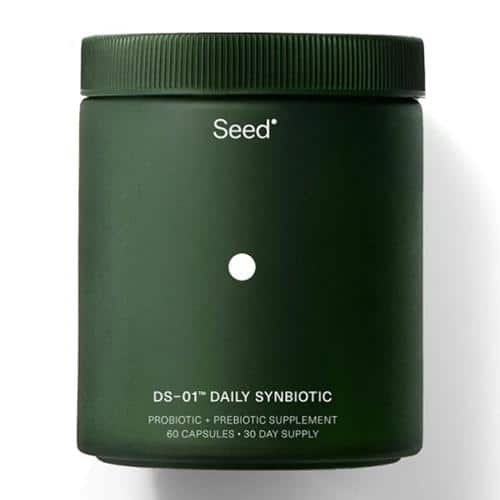
seed.com
- Type: Capsule
- Colony Forming Units: 53.6 billion AFUs (Active Fluorescent Units)
- Active Cultures: 24 broad spectrum strains including various strains of Bifidobacterium, Lactiplantibacillus, Limosilactobacillus, Lacticaseibacillus, and Ligilactobacillus
Why buy: This synbiotic product contains a diverse array of unique probiotic strains, as well as antioxidant support from Indian pomegranate polyphenolic precursors plus organic rice fiber and rice extract blend. We like that this vegan product is free of gluten, dairy, soy, shellfish, corn, sesame, and nuts to help provide gut support for just about anyone, regardless of allergies.
Best Overall: Renew Life Ultimate Flora Women’s Care Probiotic
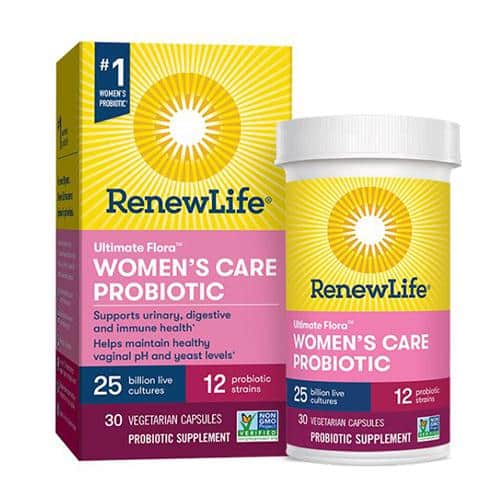
renewlife.com
- Type: Capsules/Gummies/Powder/Liquid/etc.
- Colony Forming Units: 25 billion
- Active Cultures: Bifidobacterium lactis BI-04®, Bifidobacterium lactis DSM 15954, Bifidobacterium infantis Bi-26™, and 9 diverse strains of Lactobacillus probiotic bacteria
Why buy: This non-GMO probiotic capsule contains unique probiotic strains to help support urinary health by maintaining healthy vaginal pH and yeast levels. It’s made in the U.S.A. and is guaranteed for purity, potency, and quality through its expiration date.
Best Overall: Onnit Total Gut Health
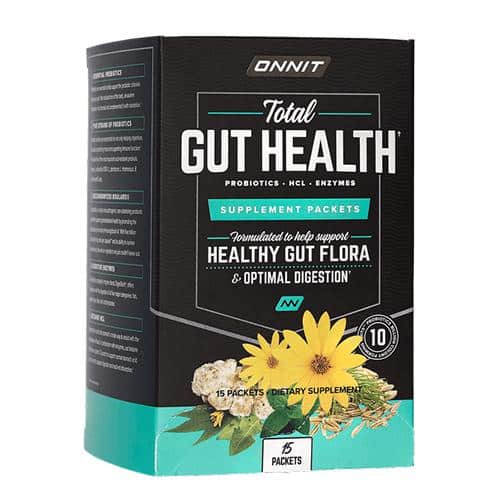
onnit.com
- Type: Shelf-stable capsule
- Colony Forming Units: 10 billion
- Active Cultures: L. acidophilus DDS-1, L. plantarum, L. rhamnosus, B. infantis, and B. lactis, Saccharomyces boulardii
Why buy: This dairy-free, vegan, soy-free, keto-friendly, and caffeine-free probiotic powder comes in convenient packets that you can take with you wherever you go to ensure you receive your daily dose of healthy bacteria. We like that it also contains prebiotics like organic Jerusalem artichoke and dandelion root to feed the healthy bacteria to help them flourish plus digestive enzymes to aid digestion.
Best Probiotic Diversity: Global Healing Floratrex Probiotic
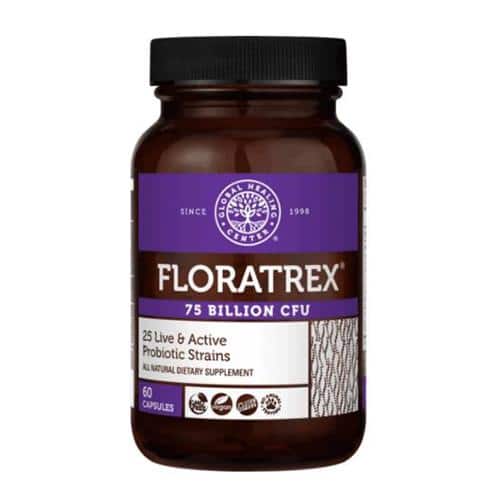
globalhealing.com
- Type: Capsule (store in refrigerator)
- Colony Forming Units: 75 billion
- Active Cultures: 25 live and active strains including strains of Lactobacillus, Bifidobacterium, Bacillus, Streptococcus, Pediococcus, and Lactococcus bacteria as well as Saccharomyces boulardii
Why buy: This non-GMO, gluten-free, vegan probiotic capsule contains a potent and diverse blend of bacteria and yeast strains along with a prebiotic blend to help the healthy bacteria flourish. As an added bonus, this probiotic blend contains PreforPro® Bacteriophage Prebiotic, which is a patented blend of “bacteria eaters” that help to fight off harmful microorganisms.
Best for Energy: Sunwarrior Probiotics
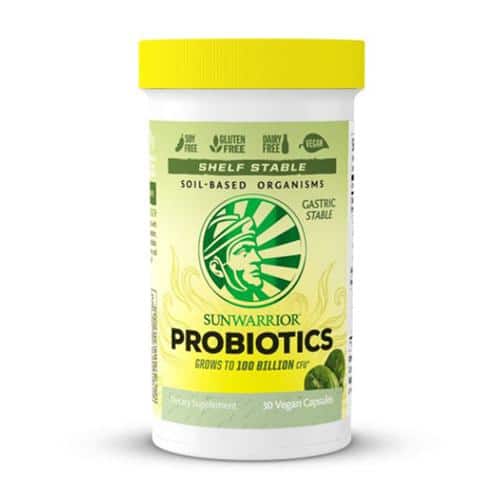
sunwarrior.com
- Type: Shelf-stable capsule
- Colony Forming Units: 10 billion
- Active Cultures: 2 different strains of Bacillus coagulans (SNZ 1969 and MTCC 5856); Saccharomyces boulardii (DBVPG 6763); Bacillus subtilis (DE111®)
Why buy: This probiotic capsule is free of soy, gluten, and dairy and is certified vegan to fit just about anyone’s lifestyle. Not to mention that it contains a prebiotic blend and algae extract to aid digestion and improve enzymatic function in the gut. We love that these plant-based probiotics use soil-based organisms for a natural boost to your digestive health and overall energy.
Best for Immune Health: Care/of Pocket Protector Probiotics
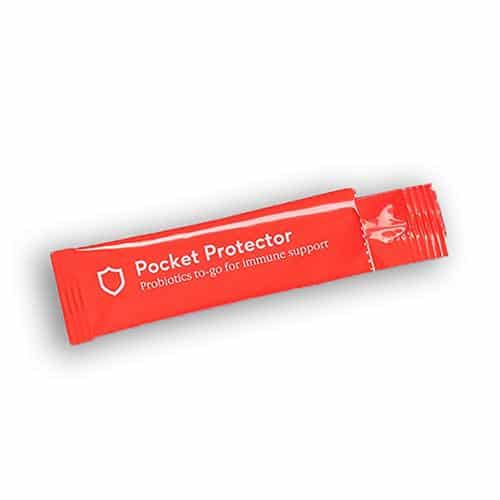
takecareof.com
- Type: Powder
- Colony Forming Units: 3 billion
- Active Cultures: L. rhamnosus GG and B. lactis BL-04
Why buy: Care/of Pocket Protector makes it easy to take probiotics anytime, anywhere. Each of these packs contain a probiotic powder with 3 billion CFU of two active cultures known to help boost your immune system. We also like that this probiotic is vegetarian, gluten free, sugar free, and comes in a red berry flavor.
Best for Chronic Constipation: Poophoria Harmony Probiotic
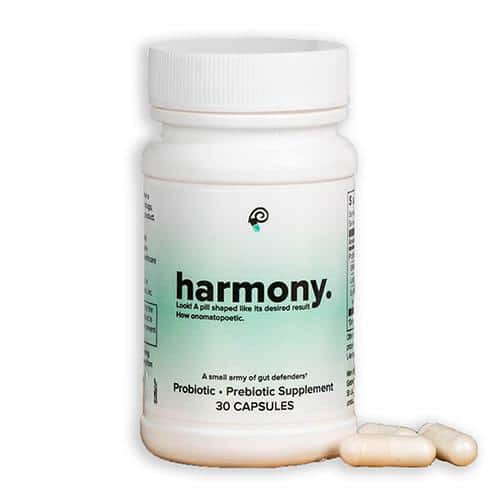
getpoophoria.com
- Type: Capsule
- Colony Forming Units: 20 billion
- Active Cultures: Bifidobacterium lactis, Lactobacillus casei
Why buy: This probiotic product contains the prebiotic, water-soluble fiber known as partially hydrolyzed guar gum (PHGG), which helps to reduce symptoms like flatulence, bloating, and indigestion. This unique probiotic blend can help to relieve chronic constipation and in turn restore balance in the gut with regular use.
Best for Active Lifestyle: NutraOne Probiotic X
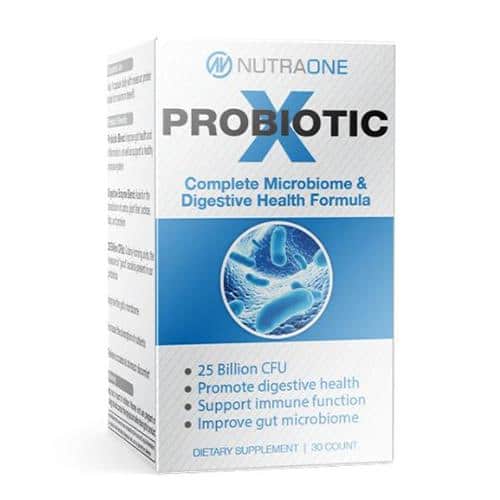
5starnutritionusa.com
- Type: Capsule
- Colony Forming Units: 25 billion
- Active Cultures: 7 Lactobacillus strains and 4 Bifidobacterium strains
Why buy: This probiotic capsule contains a potent blend of diverse healthy bacteria strains, prebiotics, and digestive enzymes for comprehensive gut health support. It also contains the Bacillus strain DE111® to help reduce muscle-related inflammation and to support exercise recovery. The is an ideal probiotic for someone with an active lifestyle to help support gut health and prevent muscle pain or soreness from slowing them down.
Best Prebiotic: Vital Plan Gut Balance
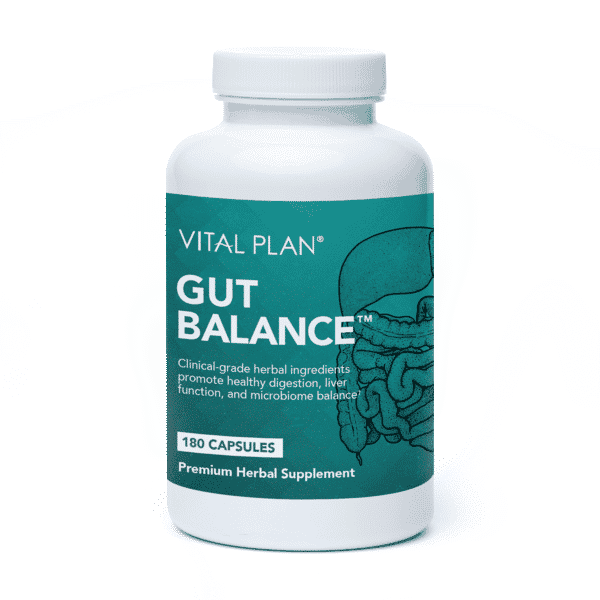
vitalplan.com
- Type: Capsule
- Colony Forming Units: n/a
- Active Cultures: Prebiotic blend of slippery elm bark, berberine, and dandelion extract
Why buy: This blend of clinical-grade herbs is specially formulated to support gut health by protecting the gut lining, decreasing intestinal permeability, and providing prebiotic support. And with independent lab third-party testing, you can ensure this gluten-free and dairy-free product is pure, potent, and safe. While not technically a probiotic, it offers an herbal alternative to help you maintain healthy digestion.
The Research on Women’s Probiotics
When it comes to women’s health, research shows that probiotics may help improve the vaginal Lactobacilli level in the body as well as support reproductive health. Not to mention that a 20-year meta-analysis of studies show that probiotics taken in the third trimester of pregnancy can help reduce the risk of an infant developing the skin disease atopic dermatitis. Also, a 2020 study shows that Lactobacillus-containing vaginal probiotics show promise to manage or prevent bacterial vaginosis.
Finally, when it comes to mental health, a 2020 study review reports that both probiotics and prebiotics may help improve symptoms in mental health conditions such as anxiety and depression. A 2019 study shows that a daily dose of a probiotic mixture containing Lactobacillus strains such as fermentum LF16, rhamnosus LR06, and plantarum LP01, as well as Bifidobacterium longum BL04) taken for 6 weeks may help improve mood, fatigue, and sleep quality.
How to Choose a Probiotic for Women
When choosing the best probiotic made for women, you should consider the following factors. Be sure to understand these factors before delving into the wellness websites and stores so you choose the probiotic that will work best for you and your health goals.
What to Look For
When shopping for a probiotic, be sure to choose a probiotic that contains:
- 1 billion or more CFUs
- A diverse array of probiotic strains that include common strains like Lactobacillus, Bifidobacterium, and Saccharomyces boulardii, to name a few.
- Links to research on their site that can verify effectiveness of the strains used in the probiotic product.
- Clearly stated expiration and use-by dates on the label.
- No ingredients that you may be allergic to.
How to Read Labels
Looking at a label on a probiotic product for women can be confusing at first. Here are certain terms you may see on a label and how to interpret them.
- Potency: The potency or CFUs of each strain, should be guaranteed until a certain date on the label.
- CFUs: The colony-forming units tell you the number of living microorganisms in the probiotic product.
- Other ingredients: This section should tell you any added compounds such as prebiotics, preservatives, flavorings, colorings, etc. This section will help you find out if the probiotic contains any compounds that you may be allergic or intolerant to or that may be harmful.
- Daily Value: A supplement label will usually tell you the daily recommended value (DRV) of certain nutrients that are in a product. For probiotics, since no DRVs have been set, asterisks are in the place where those values would be.
- Serving size: This section would tell you what the suggested daily dosage is to reap the benefits of a probiotic product.
- Use by date: This date would tell you when you should use the probiotics in order to reap the full benefits of the probiotic strains.
- Research and strain information: A probiotic label may contain the strains in a product as well as any links or resources that one could view to learn more about the research done on such strains. Sometimes a product may have the research data on the brand’s website. You can also call to request such data if you don’t see it in either of those places.
- Storage information: The label should provide guidelines on how to best store the probiotic to preserve the microorganisms. Many probiotic products will need to be kept in a cool, dry place, while others may require storage in a refrigerator.
- FDA disclaimer: This part of the label will show you that the brand is clear about the fact that claims of supplements like probiotics are not evaluated or approved by the Food and Drug Administration (FDA).
How to Use
In order to gain the most from your probiotic for women, and to make it into a daily routine, you should take it about 15 to 30 minutes before a meal. Be sure to drink at least 8 ounces of water or other fluid with it to help with transport to the gut where it can settle and do its work. Water will also help to dilute stomach acids to help the probiotic strains survive on their journey to your gut.
Finally, it can help to consume prebiotics during the day to feed your probiotic bacteria so they can thrive. Examples of prebiotics include bananas, Jerusalem artichokes, garlic, onion, asparagus, beans, other legumes like lentils, as well as apples and jicama, among other foods.
Safety & Side Effects
Probiotics are generally safe for most people, with the exception of some mild side effects like bloating or flatulence in some people. However, for some at-risk people, such as infants, elderly people, hospitalized patients, and those with compromised immune systems, probiotics may do more harm than good. Therefore, it is always a good idea to talk with your healthcare provider first before starting any supplement to ensure that it will safely fit within your current health routine.
Staci Gulbin, MS, MEd, RD is a registered dietitian, freelance writer, health editor, and founder of LighttrackNutrition.com. She has been a registered dietitian with the Commission on Dietetic Registration since 2010. Staci has graduate degrees in Biology, Human Nutrition, and Nutrition and Education from New York University, the Columbia University Institute of Human Nutrition, and Teacher’s College, Columbia University. She has been a featured expert for sites including Health.com, Shape.com, ThisisInsider.com, and Eat This Not That.

 233k
233k  41k
41k  Subscribe
Subscribe 